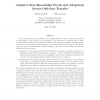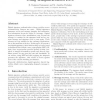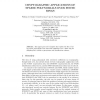103 search results - page 18 / 21 » Unconditionally secure cryptosystems based on quantum crypto... |
TCC
2009
Springer
14 years 8 months ago
2009
Springer
In the setting of secure computation, a set of parties wish to securely compute some function of their inputs, in the presence of an adversary. The adversary in question may be st...
IJNSEC
2011
13 years 2 months ago
2011
Digital signature authentication scheme provides secure communication between two users. Digital signatures guarantee end-to-end message integrity and authentication information a...
ICISC
2000
13 years 8 months ago
2000
Abstract. This paper gives new examples that exploit the idea of using sparse polynomials with restricted coefficients over a finite ring for designing fast, reliable cryptosystems...
PROVSEC
2009
Springer
14 years 3 hour ago
2009
Springer
Abstract. Oracle separation methods are used in cryptography to rule out blackbox reductions between cryptographic primitives. It is sufficient to find an oracle relative to whic...
ASIACRYPT
2001
Springer
13 years 11 months ago
2001
Springer
A Zero-knowledge protocol provides provably secure entity authentication based on a hard computational problem. Among many schemes proposed since 1984, the most practical rely on f...



